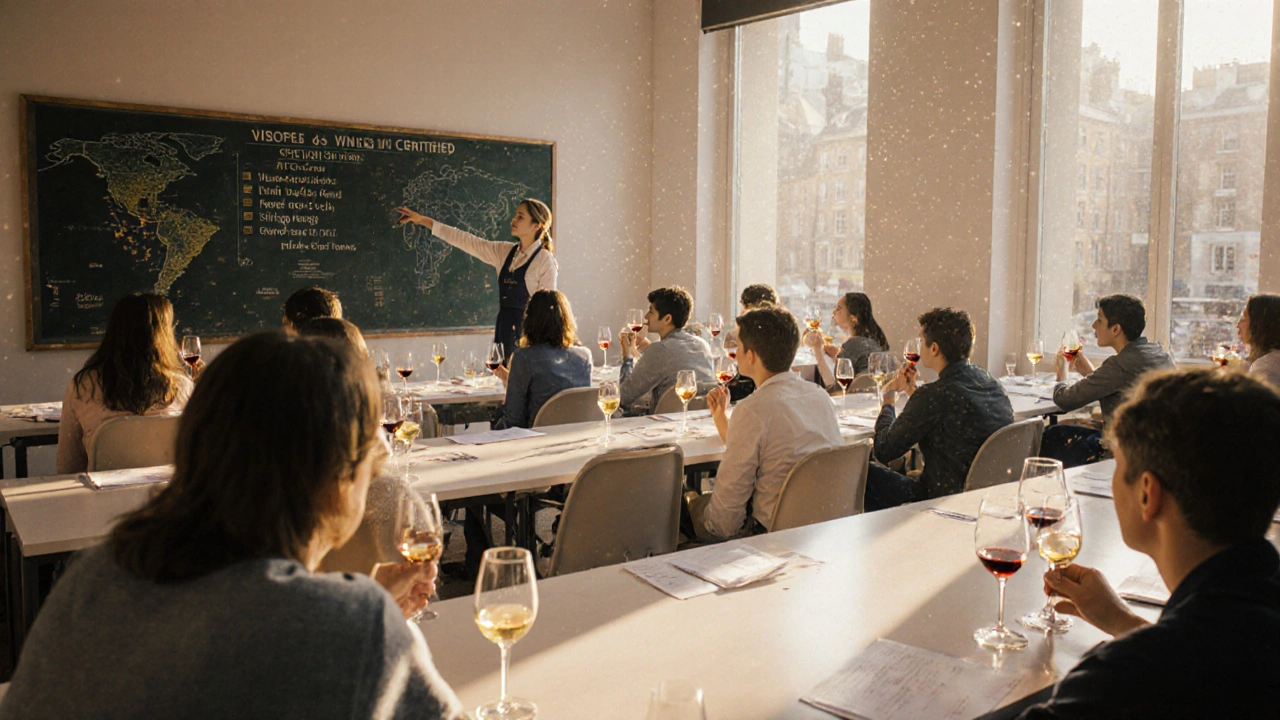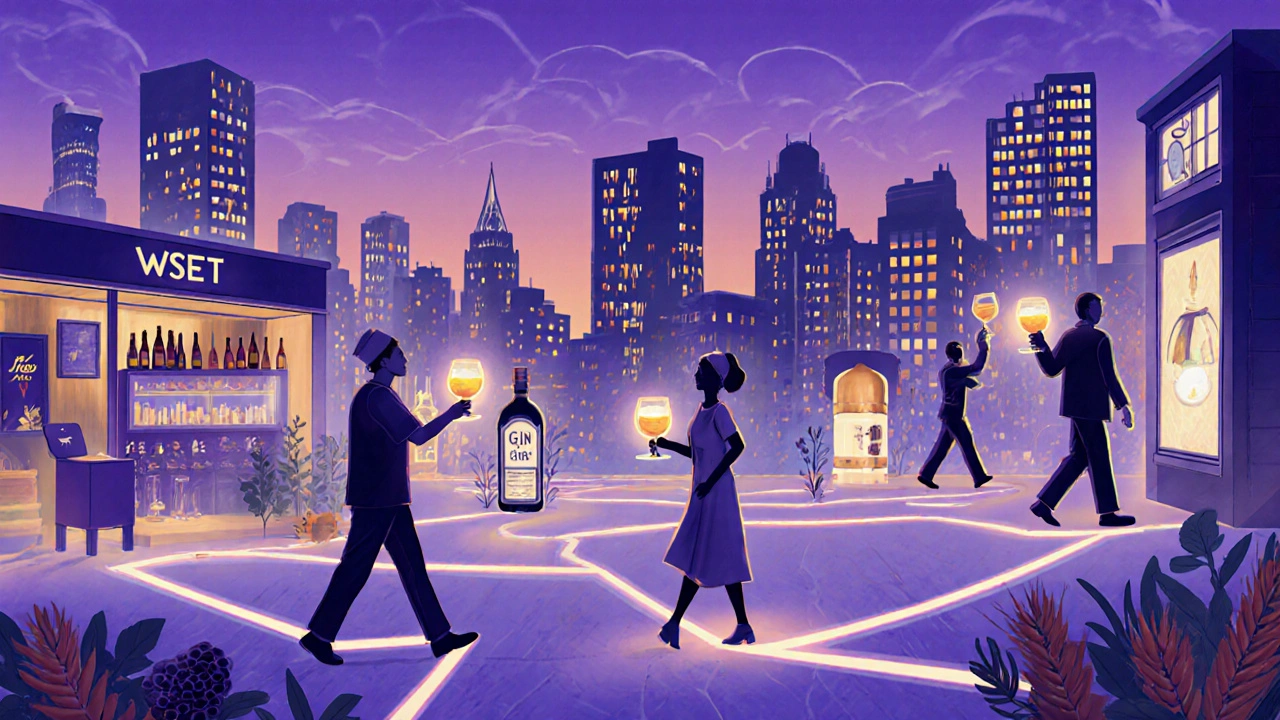
London isn’t just the capital of the UK-it’s one of the world’s top places to learn about wine and spirits. Whether you’re a bartender looking to level up, a curious foodie, or someone dreaming of a career in hospitality, the city offers more than just pubs and wine bars. It’s home to the global headquarters of the WSET, the Wine & Spirit Education Trust, and a growing network of schools, tasting rooms, and industry mentors who make learning about drinks both practical and deeply engaging.
What Is WSET, and Why Does It Matter?
The Wine & Spirit Education Trust (WSET) started in 1969 as a small program for UK wine merchants. Today, it’s the most respected certification system in the world for wine, spirits, and sake. Over 800,000 people have earned a WSET qualification since its founding. If you see someone with a WSET Level 3 or Level 4 on their LinkedIn profile, you know they’ve done serious work.
WSET courses are structured in levels: Level 1 is for beginners, Level 2 opens doors in retail and service, Level 3 is where professionals start to stand out, and Level 4 (Diploma) is the gold standard. You don’t need prior experience to start-just curiosity and a willingness to taste.
In London, you’ll find WSET classes at multiple approved centers: the main campus in Covent Garden, plus branches at City Lit, The Wine Academy, and even inside luxury hotels like The Savoy. Most courses run over weekends or evenings, so you can keep your job while you learn.
What You Actually Learn in a WSET Course
WSET isn’t about memorizing grape names or pretending you can taste “notes of wet stone and crushed violets.” It’s about building a system to describe, evaluate, and recommend drinks confidently.
In Level 2, you’ll learn how to identify the key styles of wine from major regions-like why a Chardonnay from Burgundy tastes different from one in California. You’ll taste 40-50 wines over the course of the program. You’ll learn how climate, soil, and winemaking choices shape flavor. You’ll also get a basic intro to spirits: gin, whiskey, rum, and tequila.
At Level 3, things get serious. You’ll analyze production methods in depth. For example, you’ll compare how single malt Scotch is made in Islay versus Speyside, or why a Rioja Reserva needs four years of aging before release. You’ll learn to assess quality using WSET’s systematic tasting method-looking at appearance, nose, palate, and conclusion. You’ll also study the global market: who’s buying what, and why.
By Level 4, you’re writing essays on topics like the impact of climate change on Bordeaux vineyards or the rise of organic viticulture in Spain. You’re expected to taste blind and identify grape variety, region, and vintage within minutes.
Beyond WSET: Other Paths in London’s Drink Education Scene
WSET is the biggest name, but it’s not the only game in town. London’s drink education scene is surprisingly diverse.
The Court of Master Sommeliers offers a more service-focused path, ideal for those working in fine dining. Their Certified Sommelier exam tests not just knowledge, but tableside service, pairing theory, and wine service technique. Many London restaurants now require it for head sommelier roles.
If you’re into spirits, the Institute of Spirits & Distilling (ISD) runs short, intensive courses on gin distillation, whiskey blending, and rum fermentation. One popular workshop lets you distill your own small-batch gin using local botanicals like London fog rosehip or blackberry leaf-something you can’t do in most cities.
For those who want to combine wine with food, the Guild of Food Writers offers a Wine & Food Pairing Certificate. You’ll learn how tannins interact with cheese, why sweet wines balance spicy Thai food, and how acidity cuts through fatty meats. These aren’t just theory classes-they’re multi-course tasting dinners led by chefs and sommeliers.
And then there are the independent schools. The London Wine Academy runs weekly “Taste & Talk” events where you can try rare bottles from small producers and chat with importers directly. At the London Wine Fair’s education zone, you’ll find masterclasses from producers in Georgia, Slovenia, and Lebanon-places rarely covered in mainstream courses.

Who Takes These Courses? Real People, Real Reasons
Don’t think WSET is just for sommeliers or wine buyers. The people in your class might surprise you.
You’ll sit next to a nurse who started a wine subscription box after her Level 2 course. A retired teacher who now runs weekend tasting tours in the Cotswolds. A tech worker who switched careers and now imports natural wines from the Loire Valley. A bartender who passed Level 3 and got promoted to head of spirits at a Michelin-starred restaurant.
One student, a former accountant, told me she took Level 2 because she wanted to understand what her husband was talking about when he brought home a new bottle. Two years later, she’s studying for her Diploma and just opened a small wine shop in Hackney.
The common thread? People don’t take these courses to show off. They take them because they want to feel confident-whether they’re choosing a bottle for a dinner party, explaining a wine list to a customer, or simply enjoying their next glass more deeply.
Cost, Time, and What It’s Worth
WSET Level 2 in London costs around £450-£600, including materials and tasting fees. Level 3 runs £1,500-£2,000. The Diploma? Expect £6,000-£8,000, spread over 18-24 months. That sounds steep-but it’s often less than a weekend course at a luxury resort.
And the return? It’s real. A 2024 survey by the WSET found that 78% of Level 3 graduates saw a salary increase within 12 months. Many moved into roles like wine buyer, brand ambassador, or educator. Even if you don’t change careers, the knowledge adds value. A hotel manager in Canary Wharf told me his staff’s WSET certifications led to a 22% increase in wine sales in six months.
Spirits certifications are often cheaper and shorter. A one-day ISD gin course costs £120. A sommelier certification through the CMS costs about £1,000. The time investment is minimal compared to the confidence you gain.

Where to Start in London
If you’re new to this, start here:
- Try a free tasting event. Many schools host them monthly-no commitment, just samples and chat.
- Take Level 1 or Level 2. Don’t jump ahead. You’ll learn faster by building a foundation.
- Join a local wine club. Groups like London Wine Circle meet weekly in pubs and homes across the city.
- Visit independent wine shops. Staff at places like The Wine Society, Vinoteca, or Grape & Grind are often certified and happy to recommend courses.
- Don’t rush. The best learners are the ones who taste slowly, take notes, and ask questions.
You don’t need to buy expensive bottles. Start with supermarket wines. Taste them side by side. Ask yourself: What do I like? What do I dislike? Why? That’s the real start of education.
What Comes After Certification?
Passing a WSET exam isn’t the end-it’s the beginning. Many graduates go on to write blogs, host podcasts, or start their own tasting experiences. Some become consultants for restaurants or retailers. Others travel to wine regions and work harvests in France, Italy, or South Africa.
London’s network is wide. Alumni events, industry dinners, and masterclasses are common. You’ll meet people who work for big brands, boutique importers, and even vineyard owners. Connections matter as much as knowledge.
And if you’re not sure where to go next? Walk into any wine shop in Soho or Shoreditch and ask, “What’s the best next step after Level 2?” Nine times out of ten, they’ll give you a name, a date, and a reason to show up.
Wine and spirits education in London isn’t about becoming an expert overnight. It’s about learning to taste with intention, to speak with clarity, and to find joy in the details. Whether you end up running a cellar or just picking better bottles for your kitchen table, the journey changes how you see the world-one glass at a time.
Is WSET worth the cost for someone not working in the industry?
Absolutely. Many people take WSET courses simply to enjoy wine more deeply. You’ll learn how to describe flavors accurately, understand why some wines age better than others, and make smarter choices at the store or restaurant. The confidence you gain is worth more than the price tag. Plus, you’ll meet interesting people and taste wines you’d never try on your own.
Can I take WSET courses online from London?
Yes, WSET offers online options for Levels 1-3, but the tasting component still requires in-person sessions in London. The theory can be done remotely, but you’ll need to attend a local center for the practical tastings. This ensures you’re learning to evaluate wine by sight, smell, and taste-not just reading about it.
How long does it take to complete WSET Level 4?
WSET Level 4 (Diploma) typically takes 18 to 24 months to complete. It’s divided into six units, each requiring around 12-16 weeks of study. Most students take two units at a time, with exams spaced throughout the year. It’s demanding-expect 15-20 hours of study per week-but the depth of knowledge you gain is unmatched.
Do I need to be fluent in French to study wine in London?
No. While French terms are used in wine (like “terroir” or “cuvée”), all WSET courses are taught in English. You’ll learn the key terms as part of the curriculum. Many top wine regions-Australia, California, Chile, South Africa-don’t use French at all. The focus is on understanding the wine, not the language.
Are there scholarships or financial aid for WSET in London?
Some organizations offer support. The WSET Trust gives limited grants to students from underrepresented backgrounds. The Guild of Sommeliers and the Wine & Spirit Education Trust also have bursaries for those working in hospitality. Check with your employer-many restaurants and hotels pay for staff certifications as part of professional development.